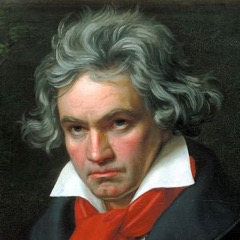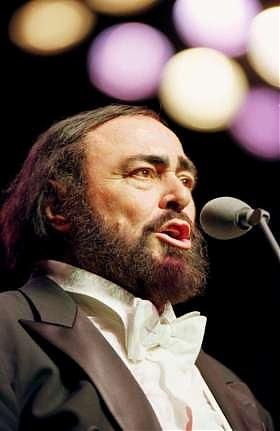Pavarotti: “I believe women generally have keener sensitivities than men. For an artist that is important. Women are quick to understand. They know what is on your mind without you having to tell them. Women also protect you. When they see that you need protection, they protect you like crazy. Women won’t let anyone get at you or hurt you.”
Luciano Pavarotti was born in Modena, Italy in 1935. His father was a baker and amateur tenor, his mother, a cigar factory worker. His father had a fine tenor voice but rejected the possibility of a singing career because of nervousness. Pavarotti began the serious study of music in 1954 at age 19. The first six years of study resulted in only a few recitals, all in small towns and without pay. When a nodule developed on his vocal cords, causing a “disastrous” concert in Ferrara, he decided to give up singing. “In those early years of struggle, I often thought of giving up, and going into teaching or selling insurance.” Pavarotti worked first as an elementary school teacher for 2 years and then as an insurance salesman. He was a member of the Corale Rossini: an all male amateur choir from Modena.
He made his debut as Rodolfo in La Bohème in Reggio Emilia in April 1961 and made his first international appearance in La Traviata in Belgrade, Yugoslavia. In 1963, he debuted at the Vienna State Opera in the same role. That same year was his Royal Opera House debut in London, where he replaced an indisposed Giuseppe Di Stefano in La Bohème.
Giuseppe Di Stefano was his favorite tenor.
In 1963 he was invited to tour Australia with Joan Sutherland. They gave 40 performances in 2 months. Pavarotti credited Sutherland for the breathing technique that sustained him throughout his career. Two years later when Joan Sutherland was singing Lucia at the Miami Opera, the tenor that was scheduled to sing canceled at the last minute. Despite Joan Sutherland and her husband conductor, Richard Boynge’s best efforts at recommending Pavarotti, the opera company wouldn’t engage him, because no one had ever heard of him. It was only because every other tenor they asked turned them down, that he was given the opportunity and made his American debut in Miami in 1965. Also that year Pavarotti made his La Scala debut in the famous Franco Zeffirelli production of La Bohème, with his childhood friend Mirella Freni and Herbert von Karajan conducting. Karajan had requested the singer’s engagement.
His major breakthrough in the United States came in 1972, in a production of The Daughter of the Regiment at the Met. He drove the crowd into a frenzy in his aria with nine effortless high Cs. He achieved a record seventeen curtain calls.
Pavarotti sang La Bohème in the first Live from the Met telecast in 1977, which attracted one of the largest audiences ever for a televised opera. There were more than 20 live opera performances taped for television between 1978 and 1994, most of them with the Metropolitan Opera.
About the mammoth outdoor concert he sang in Atlantic City Pavarotti wrote: “After my performances I always try to greet anyone who wants to come backstage to see me. That night I signed programs in my dressing room for over three hours. His manager, Herbert Breslin wrote: “Luciano, come on” I’d say, shifting from foot to foot. “This is ridiculous. It’s twelve-thirty in the morning! Let’s go home! “Calmati, P would reply. “Calm down. We are not going to leave until I have seen the last person.”
His manager recalled: “Some big name singers tried to get out of singing the Metropolitan Opera’s annual national tour, when the company used to go on the road to present opera in smaller cities around the country. It was a big hassle and it wasn’t as prestigious as appearing at the Met itself. Luciano, however, was willing to go on those tours. He understood the importance of reaching out to his public. And they loved him for it.”
He won many Grammy awards and platinum and gold discs. In 1979, he was profiled in a cover story in Time magazine. In 1990 he sang the hugely successful Three Tenors concert, held on the eve of the World Cup final in Rome with fellow tenors Plácido Domingo, José Carreras and conductor Zubin Mehta. The recording of this concert became the biggest selling classical record of all time selling over 11 million copies.
His televised concert in London’s Hyde Park, drew a record attendance of 150,000. In June 1993, more than 500,000 listeners gathered for his free performance in New York’s Central Park, while millions more around the world watched on TV. That year in Paris, he sang for a crowd of 300,000. Additional Three Tenors concerts were held during the World Cups: in Los Angeles in 1994, in Paris in 1998, and in Yokohama in 2002. Over a billion people watched the 1994 3 tenors concert live.
His manager wrote: “In his prime he approached every performance with one determination. It was ‘I will bring them to their feet.’ And he knew how to do it. He knew how to reach people and get them so excited they would jump up and scream when he was done. That was one of the big, big secrets of his success.” Here he is at the Metropolitan Opera singing his favorite encore, the aria Nessun Dorma from Puccini’s final opera, Turandot.
Pavarotti wrote: “As a singer’s reputation gets bigger and bigger, it becomes more and more difficult to meet those expectations. It is not enough to sing well. You must somehow give the audience the thrill that justifies the big reputation. You must not disappoint them. I am always afraid. In fact, I think the only way to be continuously successful is to be a little scared all the time. If you are not scared it means you think something is easy. If you think something is easy, you won’t work as hard and you will not be as good as you can be. I concentrated on doing better than I had done the day before and stopped worrying about what other singers were doing.”
He performed at benefit concerts to raise money for victims of tragedies such as the earthquake that killed 25,000 people in northern Armenia in 1988. He was a close friend of Diana, Princess of Wales. Together they raised money for the elimination of land mines worldwide. In 1998, he was appointed the United Nations Messenger of Peace, using his fame to raise awareness of UN issues, including the Millennium Development Goals, HIV/AIDS, child rights, urban slums and poverty. In 1999, Pavarotti performed a charity benefit concert in Beirut, to mark Lebanon’s reemergence on the world stage after a brutal 15 year civil war. It was attended by 20,000 people.
In 2000 Pavarotti agreed to pay the Italian government more than $7.6 million in back taxes and penalties as a result of tax evasion charges that dated from 1989 to 1995.
In 2003, at age 68, he married his former personal assistant, Nicoletta Mantovani (born 1969), 34 years younger with whom he already had a daughter. He had three other daughters by his first wife Adua, to whom he was married for 34 years.
Pavarotti annually hosted the Pavarotti & Friends charity concerts in his home town of Modena, to raise money for several UN causes joining with singers including Andrea Bocelli, Jon Bon Jovi, Bryan Adams, Bono, James Brown, Mariah Carey, Eric Clapton, Céline Dion, Elton John, Sting, the Spice Girls Stevie Wonder and Bruce Springsteen. Concerts were held for War Child, and victims of war and civil unrest in Bosnia, Guatemala, Kosovo and Iraq. After the war in Bosnia, he financed and established the Pavarotti Music Center to offer Bosnia’s artists the opportunity to develop their skills. For these contributions, the city of Sarajevo named him an honorary citizen in 2006. In 2001, Pavarotti received the Nansen Medal from the UN High Commission for Refugees for his efforts raising money on behalf of refugees worldwide. Other honors he received include the “Freedom of London Award” and The Red Cross “Award for Services to Humanity”, and the 1998 “MusiCares Person of the Year”, given to humanitarian heroes by the National Academy of Recording Arts and Sciences. He set two Guiness book of world records, one for receiving the most curtain calls, 165 of them. Through benefit concerts and volunteer work, he has raised more money than any other individual. Here he is with Charlie Rose explaining why he expanded his repertoire to include pop music and the advantages of performing in large stadium concerts.
He wrote: “One of my biggest goals as a performer and a vocal artist is to make people happy. I frequently get letters from people telling me how depressed, miserable, and even suicidal they were. Then they heard me sing on television and felt better. For maybe a few minutes they felt good about life. After my Central Park concert in 1993 the NY Times wrote that all of the 500,000 people who saw the concert had forgotten their problems by the time they left the park. Maybe for only a short time they were happy. No one can imagine how happy this makes me.”
He recorded over 30 complete operas and appeared in 37 roles. His final performance was singing “Nessun Dorma” at the 2006 Winter Olympics in Turin. Diagnosed with pancreatic cancer in July of 2006. He died the following year at age 71 at his home in Modena. His estate was valued at $474.2 million dollars.

